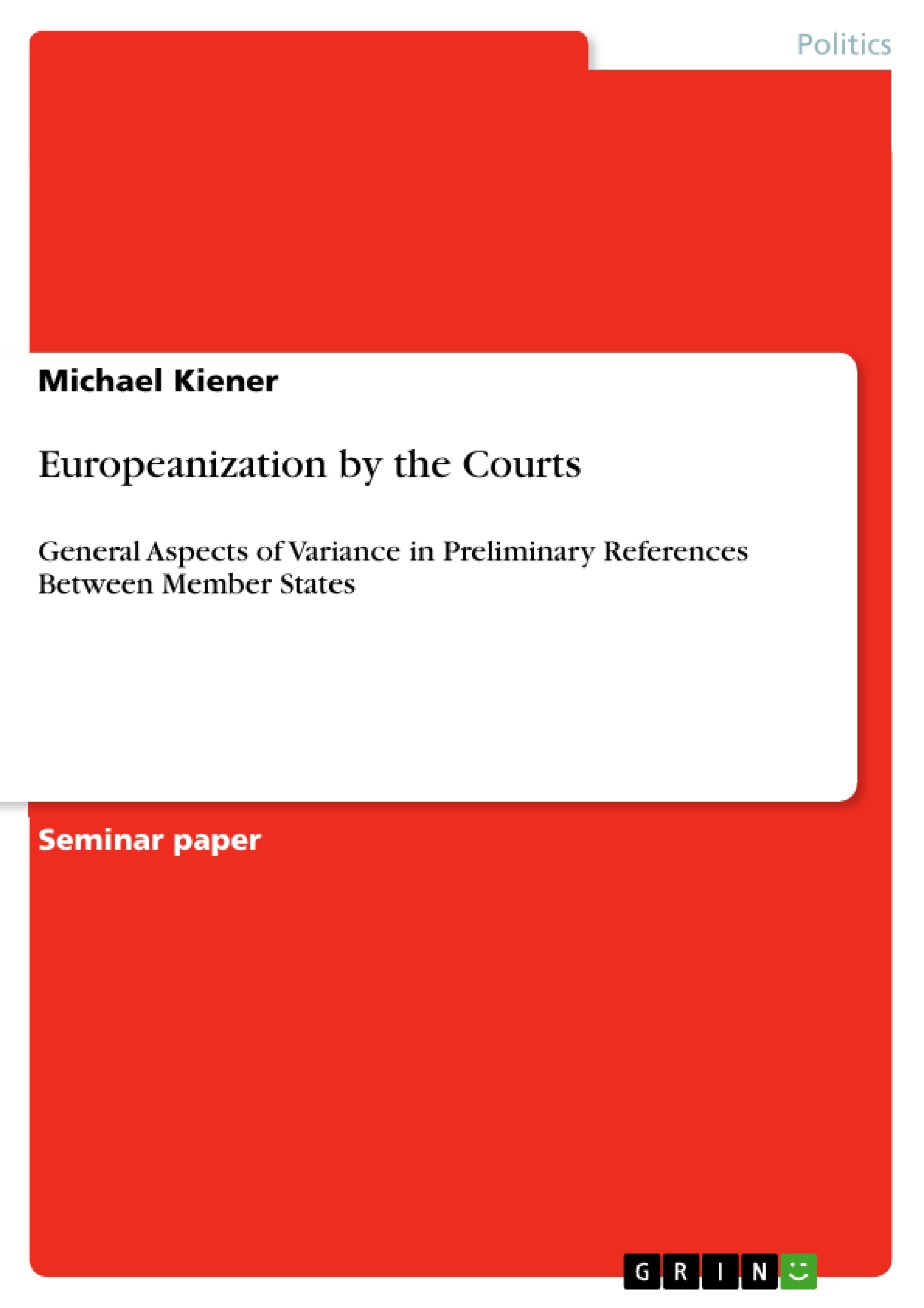Abstract
There is a broad consensus that courts play a significant role in the process of European integration. By giving rulings on preliminary references the European Court of Justice (ECJ) asserted the two central principles "supremacy" and "direct effect", which transformed the treaty into something like a constitution. The interaction between national judges and the ECJ through the preliminary reference procedure eased this process, but not all member states used this possibility in the same degree. Whereas German, Italian and Austrian judges widely used this procedure in recent years, other countries like France, Ireland, Spain and Portugal hardly did. In this empirical analysis, which is based on data covering all current member states, I try to find some general explanations and fundamental aspects of variance in preliminary references by applying Europeanization and political-institutional theory.
Inhaltsverzeichnis (Table of Contents)
- Abstract
- 1. Introduction
- 1.1. The Preliminary Ruling Procedure
- 1.2. Historical Background
- 1.3. The Traditional Model and Its Extension
- 2. Theoretical Framework and Hypotheses
- 2.1. Judicial Structure
- 2.2. Europeanization
- 2.3. Political-Institutional Theory
- 3. Analysis Framework
- 3.1. Research Design
- 3.2. Operationalization
- 4. Empirical Analysis
- 4.1. The Impacts of Europeanization on Preliminary References
- 4.2. Multiple Regression Analysis
- 5. Conclusions and Review
- 6. Appendixes
- 6.1. Appendix 1 - Tabular Scheme of Operationalization and Data Source
- 6.2. Appendix 2 - Correlation Matrix
- 7. References
Zielsetzung und Themenschwerpunkte (Objectives and Key Themes)
This seminar paper aims to investigate the variance in the number of preliminary references made by national courts to the European Court of Justice (ECJ) under Article 234 of the Treaty of Nice. The study seeks to explore the factors influencing this variation, primarily through the lens of Europeanization and political-institutional theory. Key themes addressed include:- The role of the preliminary reference procedure in European integration
- The significance of "supremacy" and "direct effect" principles in shaping EU law
- The impact of national political and judicial structures on judicial behavior regarding preliminary references
- Empirical analysis of variations in preliminary references across Member States
- Exploration of the domestic effects of Europeanization on national courts
Zusammenfassung der Kapitel (Chapter Summaries)
- Chapter 1: Introduction: This chapter introduces the preliminary ruling procedure under Article 234 of the Treaty of Nice, highlighting its importance in European integration. It delves into the historical background of the procedure, tracing its evolution from the founding Treaty of Rome and discussing landmark cases that established the principles of "direct effect" and "supremacy" of EU law. This chapter also presents the central research question: "How can we explain the variance in the number of preliminary references between member states?"
- Chapter 2: Theoretical Framework and Hypotheses: This chapter outlines the theoretical framework employed in the analysis. It introduces the concepts of Europeanization and political-institutional theory, focusing on how they can help explain variations in judicial behavior regarding preliminary references. The chapter also presents the research design and operationalization of key variables.
- Chapter 3: Analysis Framework: This chapter describes the methodology used in the research, detailing the specific data sources and analytical techniques employed. It focuses on the empirical analysis of variations in preliminary references across Member States, examining the impact of Europeanization on the frequency of references.
- Chapter 4: Empirical Analysis: This chapter presents the findings of the empirical analysis, exploring the relationship between various factors and the number of preliminary references. It discusses the impacts of Europeanization, national political structures, and judicial structures on the decisions of national courts regarding preliminary references.
Schlüsselwörter (Keywords)
This paper focuses on the field of European Union law and its implementation, analyzing the preliminary reference procedure as a key mechanism for European integration. Core concepts include Europeanization, political-institutional theory, judicial structure, and the impact of domestic factors on legal decision-making. The paper also explores the principles of "supremacy" and "direct effect" as crucial elements in shaping the relationship between national courts and the ECJ.- Arbeit zitieren
- MScEc Michael Kiener (Autor:in), 2003, Europeanization by the Courts, München, GRIN Verlag, https://www.grin.com/document/186039



